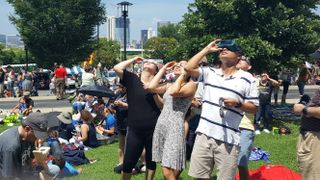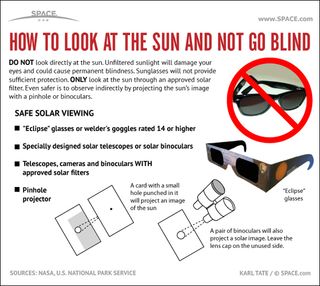Is It Safe to Reuse Your Solar Eclipse Glasses?
Here's how to tell if those old eclipse glasses are still usable.

If you have ever seen a solar eclipse, you may have accumulated a collection of eclipse glasses over the years with different logos plastered on the sides. But just because the design of the glasses changes year after year, it doesn't mean the older ones are completely useless.
In fact, eclipse glasses are reusable so long as you make sure that they're still, well, usable. But don't simply throw on an old pair of eclipse glasses without checking them for scratches or other damage first, or you could risk inflicting long-term or permanent damage to your eyes.
If you're preparing for the upcoming total solar eclipse on July 2 in South America, it's time to find those old eclipse glasses that are certified and still in good condition in order to make them safe for reuse.
Related: Solar Eclipse: An Observer's Guide (Infographic)
Staring at the sun for longer than a fraction of a second can cause permanent damage to the eye's retina, and may even lead to blindness. This is where solar eclipse glasses come in, as they are typically 100,000 times darker than regular sunglasses and are made to block out the sun's harmful ultraviolet rays.
Therefore, all filters must comply with international safety standards to adequately protect your eyes from the sun. However, it is not enough to see the International Organization for Standardization (ISO) certification on the sides, Rick Fienberg of the American Astronomical Society (AAS) told Space.com, since some manufacturers have been printing fake labels on the glasses without testing to ensure that they meet the safety standards.
So, Fienberg said, if you want to reuse your old eclipse glasses, then make sure they were purchased from one of the approved manufacturers on AAS' list of reputable vendors of solar filters and viewers.
Get the Space.com Newsletter
Breaking space news, the latest updates on rocket launches, skywatching events and more!
"If not, or if you just don't know for sure, discard the glasses – do not use them," Feinberg said.
If the glasses are properly certified, you also want to ensure that they have not been damaged over the years."Always inspect your solar filter before use; if scratched, punctured, torn or otherwise damaged, discard it," he added.

Older editions of glasses used to be printed with a warning that they could not be reused after one to three years. However, according to Feinberg, these warnings are outdated and do not apply to the newer, ISO-certified glasses.
If you do own a pair of certified eclipse glasses that are in good condition, and you don't have an eclipse viewing on your calendar any time soon, then there are also ways to donate the glasses to children in regions where an eclipse is taking place.
Astronomers Without Borders has been collecting old solar-eclipse glasses as part of their donation program and sending them to schools and local organizations in countries where they may not be available.
Editor's Note: If you snap an amazing picture of the July 2, 2019 total solar eclipse and would like to share it with Space.com's readers, send your photos, comments, and your name and location to spacephotos@space.com.
- How to Tell if Your Eclipse Glasses Are Unsafe
- What To Do With Your Eclipse Glasses
- Total Solar Eclipse 2019: Complete Coverage
Follow Passant Rabie @passantrabie. Follow us on Twitter @Spacedotcom and on Facebook.
Join our Space Forums to keep talking space on the latest missions, night sky and more! And if you have a news tip, correction or comment, let us know at: community@space.com.

Passant Rabie is an award-winning journalist from Cairo, Egypt. Rabie moved to New York to pursue a master's degree in science journalism at New York University. She developed a strong passion for all things space, and guiding readers through the mysteries of the local universe. Rabie covers ongoing missions to distant planets and beyond, and breaks down recent discoveries in the world of astrophysics and the latest in ongoing space news. Prior to moving to New York, she spent years writing for independent media outlets across the Middle East and aims to produce accurate coverage of science stories within a regional context.
